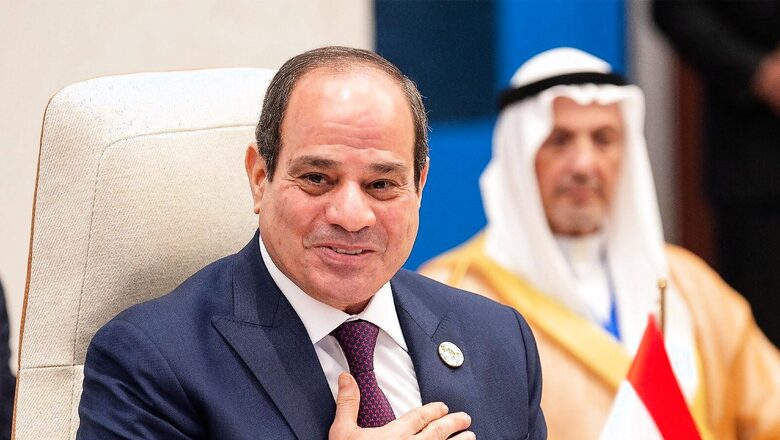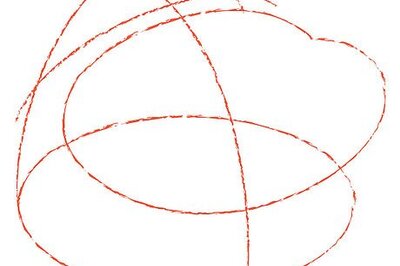
views
Egypt’s President Abdel Fattah al-Sisi will be the chief guest at the Republic Day celebrations in January, the Ministry of External Affairs said on Sunday. “This is the first time that the President of the Arab Republic of Egypt will be the Chief Guest at our Republic Day,” the MEA said in a statement.
Prime Minister Narendra Modi had sent a formal invitation to al-Sisi which was handed over to the Egyptian president by External Affairs Minister S Jaishankar on October 16. Both countries are celebrating the 75th anniversary of the establishment of diplomatic relations this year.
Sisi, who was born in Cairo in 1954, joined the infantry after graduating from the Egyptian Military Academy in 1977, eventually rising to command a mechanised division.
After serving as a military attaché in Saudi Arabia, chief-of-staff and then commander of Egypt’s Northern Military Zone, he was appointed head of Military Intelligence, a report by BBC states.
The then-general rose to prominence in 2011 when he was named a member of Egypt’s Supreme Council of the Armed Forces (Scaf), which took over after popular uprising forced longtime President Hosni Mubarak to resign.
General Sisi, a devout Muslim, was reportedly tasked with liaising with the Muslim Brotherhood, an influential Islamist movement that had been outlawed under Mubarak.
Mohammed Morsi, a senior Brotherhood figure, was elected Egypt’s first democratically elected president in June 2012. He appointed Gen Sisi as commander-in-chief of the military and defence minister two months later.
Sisi rose to prominence in Egyptian politics in the summer of 2013, following the emergence of a protest movement known as Tamarrud (“Rebellion”), which demanded that Morsi be removed or replaced through an early election. On June 30, protests against Morsi had reached a scale and intensity not seen since Mubarak’s ouster in February 2011, with some demonstrators chanting for Sisi to do the same. On July 1, Sisi issued an ultimatum to Morsi, demanding that the crisis be resolved within 48 hours or face military intervention. Morsi offered some talks but refused to step down or agree to early elections, so the military deposed him and arrested him on July 3. Adly Mansour, a figurehead president, was installed, but it was clear that Sisi, who retained the title of defence minister, wielded power, states a report by Britannica.
The intervention was condemned by Morsi’s Muslim Brotherhood supporters, who accused Sisi of undermining democracy by deposing a freely elected president. Sisi countered that the military had carried out the will of the Egyptian people, as expressed in anti-Morsi protests, and that the Islamist-dominated administration led by Morsi had prioritised the Muslim Brotherhood’s interests over the country’s overall interests. As the Muslim Brotherhood and its allies demonstrated across the country and refused to participate in the transitional process, tensions between the Muslim Brotherhood and the military grew. Meanwhile, Muslim Brotherhood leaders were arrested, and the group’s media outlets were closed down.
On July 8, while the Muslim Brotherhood was protesting outside a military base, security forces opened fire, killing over 50 people. Faced with continued Muslim Brotherhood opposition, Sisi urged Egyptians to rally in support of the military against “violence and terrorism.” On July 26, hundreds of thousands of Egyptians took to the streets across the country to show their support. This was followed by a violent crackdown on Morsi and Brotherhood supporters.
Al-Sisi then resigned from the military to run in elections in 2014, which he won. After years of political unrest in Egypt, he stated that he would prioritise economic development.
Indo-Egyptian relations are expanding in a variety of areas. “Regular political and diplomatic engagements in recent times are based on a shared understanding on various important regional and international issues. Security and defence have emerged as one of the most important areas of bilateral relations with focus on counter-terrorism and defence trade,” Md. Muddassir Quamar, Fellow at Manohar Parrikar Institute for Defence Studies & Analyses told the Financial Express.
“Egypt is a major buyer of weapons and is in the process of rapid military modernization,” he continues, “and India has recently put an effort on strengthening its defence manufacturing, both for ‘atmnirbharta’ in meeting its needs and for enhancing defence exports,” he added.
Read all the Latest Explainers here

















Comments
0 comment